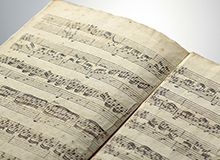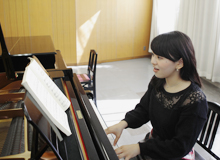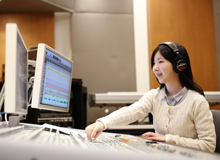The Department of Music Studies
Purpose
The Department of Music Studies consists of four courses: Composition, Musicology, Music Education, and Art Management. In our close-knit society and with the globalization of knowledge and information, students who study music professionally also need to have broad perspectives and diverse abilities to keep up with this changing world. This department combines basic education rooted in traditional music, with the new technological methods that are rapidly developing in our modern society, into a new way of thinking. In order to acquire a wide range of knowledge and the ability to apply that in the real world, the curriculum allows students to take not only subjects within their own course, but also a variety of classes from other courses.
At the entrance examination, students choose one of the following two ways to study: the Open Major System or the Fixed Major System
Two Study Systems
1. The Open Major System
In the first year, students will learn the fundamentals of four courses in a comprehensive and cross-disciplinary way. During this, they will identify the direction they want to take as well as their personal aptitudes and will select courses from the second year onwards to work on as specialized studies. In this course, students take at least four basic subjects under the appropriate support of an experienced faculty advisor and decide on courses from the second year based on their talents, abilities, and ambitions. In addition, so as to achieve the same educational results as those selecting the Fixed Major System (see below) in the first year, additional curriculums are available for the courses students choose in the second year.
2.The Fixed Major System
For those who have decided on a course of specialized study to embark upon from their first year, they may choose the Fixed Major System. If you select the Fixed Major System, the course you select will add to or partially change your exam subjects in the entrance exam.
Course List

Composition
Music is constantly expanding and diversifying. The aim of this course is to develop musicians who can cope with that. In order to achieve this, it is essential to acquire composition techniques learned from traditional music along with computing and recording know-how centered on DAW. This course expands the possibilities of musical expression for students in both acoustic and electric music.
In the Composition course, along with learning traditional classic composition methods such as harmony, counterpoint, and orchestration, students study popular, jazz and DAW musical production using computers. We support both “artistic music” and “commercial music“ as we aim to foster “multi-genre composers”.
There are many opportunities provided to present your compositions, so you can learn practically how to interact with musicians. Student learn how to use music production software such as Finale, and record and edit using programs such as Pro tools.

Musicology
The Musicology course explores the history of Western music, Japanese music and the music of various ethnic groups in a multifaceted way, including the relationship between music and culture. Students are introduced to a wonderful world of music previously unknown to them, thanks to a variety of experts, and their pursuit of knowledge is deepened with facilities like the library and instrument museum (scheduled to open in the near future).
As regards implementing those skills, concerts can be planned to explore the research results of musicology, while learning how to perform with various instruments.
Students will learn the basics of Musicology in “An Introduction to Musicology”, focus on various areas of investigation in “Musicology Research” (2nd to 4th years), sharpen their own critical thinking, and prepare a graduation thesis on the theme that they have set themselves in the fourth year. The graduation thesis theme covers Japanese, Western and ethnic music across all eras.
When you study Musicology, not only are you able to gain the theoretical skills and expertise necessary for a career in music, but also the capability to publicize your own research results.

Music Education
The Music Education course aims to foster talented people who can contribute to society in various situations through musical instruction.
The Music Education course aims to develop talented people who play an active role as educators through various kinds of music instruction, including as school teachers, or in music classes and organizations.
Music instructors need to have great leadership abilities supported by extensive knowledge, technical skills and a warm nature. It is especially important for teachers at schools to have a sense of duty and passion towards education, as well as specialized knowledge and practical ability to accurately teach their subject and provide guidance in club activities.
The curriculum of this course is designed to meet a wide range of needs and to prepare your leadership qualities.

Art Management Course
The Art Management course aims for the development of artistic sensibility and management ability and the cultivation of art managers who play an active role in performing arts locations.
In this course, students will learn about planning, producing and advertising various performances such as concerts and operas, as well as the management and operation of cultural facilities such as theaters and halls. Experts who are active across various fields within art culture serve as lecturers, and students gain practical training experience through numerous performances conducted both inside and outside the campus, as well as taking specialized subjects in music history, music theory, and musical works. Students will also learn the basics of digital music and recording technology at a specialized facility. Focussing on personal development to play an active role in society, students learn information processing and document creation, develop communication and presentation skills, and acquire business manners.
